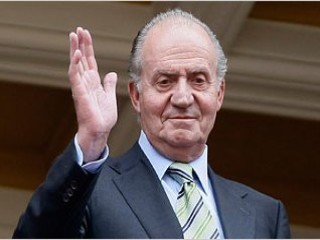
Juan Carlos I Of Spain biography
Date of birth : 1938-01-05
Date of death : -
Birthplace : Rome, Italy
Nationality : Spanish
Category : Politics
Last modified : 2011-08-19
Credited as : King of Spain, Queen Sofia of Greece, House of Bourbon
1 votes so far
Juan Carlos spent his early years in Italy and first came to Spain in 1947 for his education. After his father suggested in 1945 that Franco should step down as leader of the country and generally began opposing Falangist policies, Franco grew resentful and turned with increasing interest to Juan Carlos and his education, especially his military education. In 1955 Juan Carlos entered the General Military Academy at Zaragoza and later attended the Naval Military School at Marín in Pontevedra, the General Academy of the Air at San Javier in Murcia, and the University of Madrid.
Although a 1947 Francoist law abolished the republic and established Spain as a "representative monarchy," throughout Franco’s lifetime Spain remained without a ruling monarch. On July 22, 1969, however, Franco presented to the Cortes (parliament) a law designating Juan Carlos the future king of Spain. The move was facilitated by two events: in December 1968 the Carlist pretender, Carlos Hugo de Borbón-Parma, had been expelled from the country; and on Jan. 7, 1969, Juan Carlos said for the first time that he would accept the throne if offered (previously he had maintained that his father’s claim preceded his own).
Although Juan Carlos swore loyalty to Franco’s National Movement in 1969, he demonstrated far more liberal and democratic principles after his accession to the throne in 1975, appointing reformist prime minister Adolfo Suárez in 1976 and encouraging the revival of political parties and amnesty for political prisoners. In 1981 Juan Carlos underscored his democratic credentials by taking swift action to deflate a military coup that threatened to topple Spain’s nascent democracy and return the government to Franconian reactionary lines; in doing so, he alienated the military sector but preserved the state of democracy that made possible the accession of a socialist government in late 1982. Also, a liberal divorce law was passed in 1981 and a law granting limited abortion rights in 1983.
In 1981 Juan Carlos became the first Spanish king to visit the Americas and was the first crowned monarch to make an official visit to China; in so doing, he became the first Spanish head of state to visit a communist country. Throughout his tenure as king, he traveled abroad on many goodwill missions, including a 1985 trip to France, where he and French Pres. François Mitterrand signed an accord calling for military and political cooperation between their two countries; a meeting with U.S. Pres. Bill Clinton in 2000; and a surprise visit to Spanish troops in Afghanistan on New Year’s Eve 2007. The king remained popular with most Spaniards at home, but in the early 21st century, he was criticized by leftists who called for independence for Catalonia province.
Juan Carlos was married in Athens on May 14, 1962, to Princess Sophia of Greece, daughter of King Paul. They had two daughters, Elena and Christina, and a son, Felipe.
















